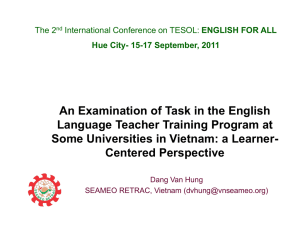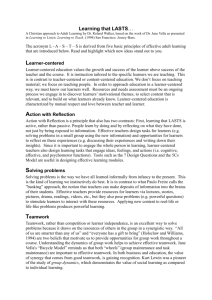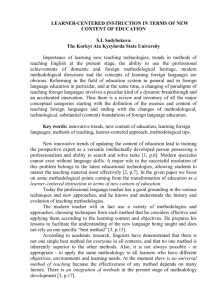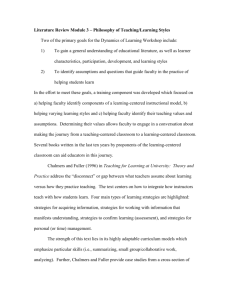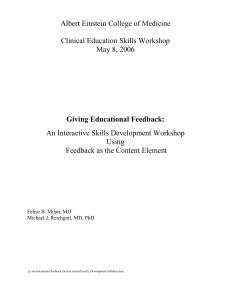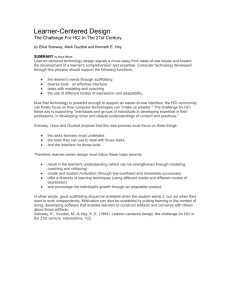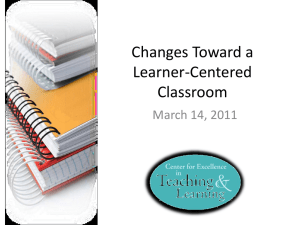HISTORY OF THE APA LEARNER-CENTERED PSYCHOLOGICAL
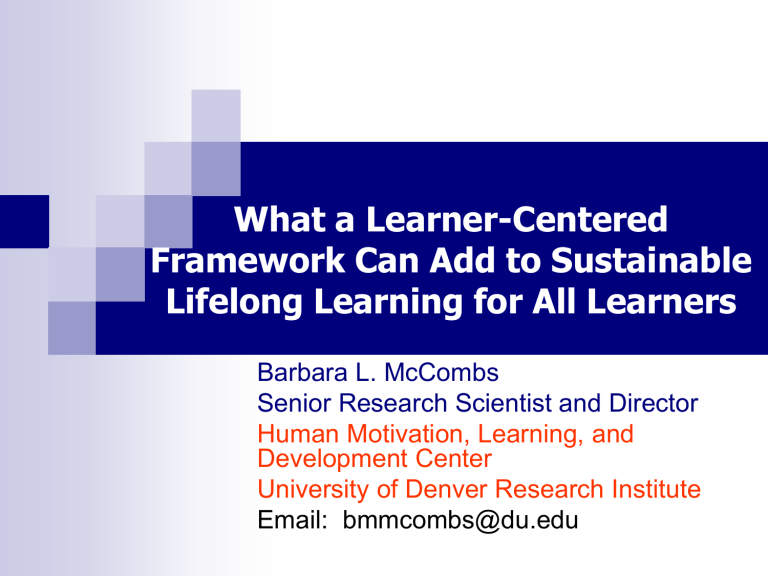
What a Learner-Centered
Framework Can Add to Sustainable
Lifelong Learning for All Learners
Barbara L. McCombs
Senior Research Scientist and Director
Human Motivation, Learning, and
Development Center
University of Denver Research Institute
Email: bmmcombs@du.edu
Overview of Presentation
To describe my own journey in identifying global issues in learning and instruction
To describe the work of my research center in the US and the research base for practices that improve motivation and achievement across age levels both nationally and internationally
To describe what I’ve learned about practices that improve motivation and achievement in several international studies
To identify some of what I think are the most important global research issues
To invite creating the vision of learner-centered learning communities where students and teachers are partners in co-creating positive climates and cultures of learning
How the Journey Began
My family beginnings
Trying to understand natural love of learning
Researching different models of motivation
Finding research validated principles
Exploring how these principles translate into practice in the US and other countries
Seeing what’s needed in new educational paradigms
What Does the Research Say?
What is the evidence?
Where does it come from?
Is there any global confirmation?
How does the evidence translate into practice?
My Research Center
:
Human Motivation, Learning, and
Development (HMLD)
Purpose: The Center conducts “applications-driven” research, development, and evaluation in the areas of human motivation, learning, and development so that research-validated principles can be used to enhance human potential and performance. The Center draws on the multi-disciplinary expertise of University of Denver faculty and other recognized experts and organizations working in the same areas.
FOCUS OF CENTER ACTIVITIES
Center activities are directed at teachers and learners of all ages, kindergarten through college and beyond.
Learner- and person-centered models for addressing human motivation, learning, and development needs are applied to research, development, and evaluation activities within a living systems framework. Specific areas of focus in which the research-validated learnercentered principles and practices are applied include:
Professional Development
School Violence Prevention
Systemic Educational Reform
Personal and Organizational Systems Change
TYPES OF CENTER PROJECTS
The Center conducts R&D projects with K-12 school systems, higher education teacher education programs, and evaluations of national educational program and system reform models.
The Center also collaborates with multidisciplinary teams of professionals from a variety of universities, including international partners, and other non-profit organizations
THE APA LEARNER-CENTERED PRINCIPLES AS THE
RESEARCH BASE FOR UNDERSTANDING PRACTICES
THAT ENHANCE LEARNING AND MOTIVATION
Based on published research on learning, individual differences, and needs of learners
Include strategies responsive to and respectful of diverse needs of students as learners
Imply that programs and practices must include strategies consistent with the research-validated learner-centered psychological principles
Strategies focus on creating positive relationships, providing choice and control, and implementing approaches to building caring learning communities
Represent a paradigm shift or transformed and balanced view of cognitive, social, and emotional issues that focuses on learning and learners
WHY IS THIS FOUNDATION
IMPORTANT?
A compelling rationale is needed to balance a focus on learners and learning.
There is an increased global recognition that educational systems must prepare students for life, productive careers, and to be learners for life.
There is growing research support that academic standards and content expertise are not sufficient to assist students in developing into knowledgeable, responsible, caring, and academically competent lifelong learners.
One of the primary benefits of basing practices on research-validated Principles that span over a century of research is that they are theoretically, empirically, and experientially grounded based on feedback from teachers and other educators.
BACKGROUND ON DEVELOPMENT OF
LEARNER-CENTERED PRINCIPLES (LCPs)
The original document was developed in 1991-92 and disseminated in 1993 in response to changes in national educational policy that ignored knowledge base on learning and learners.
The LCPs emerged from an intensive review of a century of research on learning, motivation, development, and individual differences in learning.
This document was revised in late 1997 as new knowledge became available and new concerns with national educational policy surfaced.
As current research has continued to define evidencebased practices, a new APA Task Force is creating a set of tools for communicating evidence based practices that are developmentally appropriate for pre-K-12 students.
APA LEARNER-CENTERED
PSCYHOLOGICAL PRINCIPLES
14 principles divided into 4 domains or factors influencing learning and achievement
Imply a holistic look at learners, their needs, and the contexts/practices that best meet these needs across the age span
See separate handout of Table 1 for a listing of all 14 principles
Can also download full version at: http://www.apa.org/ed/cpse/LCPP.pdf
METACOGNITIVE AND
COGNITIVE FACTORS
Learning is a natural process
Learning is personal constructions of meaning
Learning is relating personal meanings to shared knowledge
Learning is facilitated by higher-order thinking processes
Learning is facilitated by environmental factors, including culture, technology, and instructional practices
MOTIVATIONAL AND
AFFECTIVE FACTORS
Motivation is a function of internal beliefs, values, interests, expectations, emotions, states of mind
Motivation to learn is a natural process when beliefs and emotions are positive and when external context is supportive
Motivation-enhancing tasks facilitate higher-order thinking and learning processes as a function of perceived relevance and meaningfulness as well as optimal difficulty and novelty
DEVELOPMENTAL AND
SOCIAL FACTORS
Learning is influenced by unique genetic and environmental factors
Learning is facilitated by developmentally appropriate experiences and materials
Developmental differences encompass physical, intellectual, emotional, and social areas
Learning is influenced by social interactions, interpersonal relations, and communication with others
INDIVIDUAL DIFFERENCES
FACTORS
The same basic principles of learning apply to all individuals
Learners differ in learned and genetic
“preferences” for how they learn
Individual’s unique perceptions, learned beliefs, and prior learning experiences provide a “filter” for learning new information and interpreting
“reality”
Setting appropriately high and challenging standards and assessing the learner and learning progress are integral parts of the learning process
Understanding Motivation and Learning
Learning as a natural process
Curiosity as a natural process
Motivation to learn as a natural process
What happens in schools?
Students can’t follow their natural interests – to inspire students they need to see relevance and meaning
Students can’t make choices and be autonomous
– to engage students they need to have a say in what they learn and how they learn it
WHAT DOES THE LEARNER-CENTERED
FRAMEWORK ADDRESS?
The Learner perceptions, needs, motivation
Learning Opportunities types of teaching and learning experiences that can meet learner needs for success, belonging, autonomy
Learning Outcomes including affective, cognitive, social, and performance domains
Learning Context climate for learning, including expectations, teacher and technology support, time structures, adaptability to student needs, and a focus on fostering positive learning communities
Learner-Centered Model: A Holistic Perspective
Learner
Learner
Learning
Knowledge
Integration of Factors
Impacting
Learners and Learning
•Cognitive and Metacognitive
•Motivational and Affective
•Developmental and Social
•Individual Differences
Translating the Learner-
Centered Principles into Practice
Selecting a theoretical framework that captures the LCPs
Person-centered
Phenomenological
Identifying evidence-based practices consistent with the LCPs
Measuring the efficacy of person and practice variables in predicting important learner outcomes
Evidence Based Characteristics of
Learner-Centered Teachers
acknowledge and attend to each student’s uniqueness understand learning and motivation to learn create a positive climate that feels safe and secure assume that all students want to learn and succeed are knowledgeable of subject matter provide choice and personal responsibility for learning have confidence in their ability to teach and reach different students provide high quality explanations while encouraging students to think critically and independently provide opportunities for active learning and student engagement in learning see themselves as co-learners and partners with students in sharing responsibility for learning
Evidence Based Characteristics of
Learner-Centered Practices
The emphasis is on methods that address the whole learner and his or her academic and non-academic needs and students are partners in co-creating learning experiences, climate, and community.
Practices at the classroom and school levels begin with strategies for getting to know each learner and forming a safe, inclusive learning community before academic learning begins.
Teachers see themselves as learners and co-learners with students and each other, and as facilitators rather than directors of student learning.
Success is measured by academic and non academic outcomes and by sustaining attitudes of ongoing learning, change, and improvement.
Learner-Centered Professional
Development Tools
Help teachers engage in their own selfassessment process
Encourage teachers to reflect and think critically about their beliefs and practices
Allow teachers to examine educational theories and practices in light of their beliefs and experiences
THE ASSESSMENT OF LEARNER-
CENTERED PRACTICES (ALCP): Tools for
Creating Learner-Centered Classrooms
TEACHER SURVEYS - for increasing awareness of impact on students
Teacher Beliefs and Assumptions about learners, learning, and teaching
Teacher Characteristics related to effective teaching
Teacher Assessment of Classroom Practices in areas most related to student motivation and achievement
STUDENT SURVEYS - for identifying students not being reached
Student Assessment of Classroom Practices in same areas as instructor assessments
Student Motivation, Interests, Learning Strategies
Characteristics of Learner-
Centered Tools
What they are
Non-threatening
Tools for learning and change
Opportunities to share expertise
What they are not
Evaluations of competence
One-size-fits-all strategies
“Cookbook” teaching procedures
RESULTS WITH ALCP
SURVEYS: K-20
Student perceptions of teacher practices significantly predict their motivation and achievement.
Teacher beliefs and perceptions of practice important in influencing student perceptions of practice, and indirectly, their motivation.
Establishing positive relationships and learning climate most important domain of practice.
Supporting student choice and control, honoring student voice, also important domain of practice for motivation and achievement.
What Can Be Learned From Learner-
Centered Self-Assessment Tools?
How I Can Improve Instruction and Student
Achievement
How I Can Create a Learner-Centered
Environment
Areas Where I am Strong or Weak When
Creating Learner-Centered Classrooms
How to Relate to My Students Both
Academically and Interpersonally
Areas Where I Can Accomplish My Greatest
Professional Development and Growth
How I Can Use Self-Assessment as a Tool for
System-Wide Reform and Change in Thinking
Figure 2 - Creates Positive Interpersonal Relationships
TEACHER EXAMPLE almost always 4.00
3.50
often 3.00
2.50
sometimes 2.00
1.50
almost never 1.00
.50
Students
Scores range from 1(low) to 4(high)
Line represents Learner-Centered Rubric.
Student Perceptions
Teacher Perceptions
GUIDED REFLECTION AND
FEEDBACK PROCESS
Provides individual and confidential feedback on scores relative to the
Learner-Centered Rubric
Allows reflection on areas of beliefs or practices that could shift in more learnercentered directions
Encourages faculty to take personal responsibility for ongoing learning and continuous improvement of practice
RESEARCH-VALIDATED DEFINITION OF
“LEARNER-CENTERED”
Reflection of the learner-centered Principles in the programs, practices, policies, and people that support learning for all learners
Balances the concern with learning achievement and the concern with diverse learner needs
Is a complex interaction of qualities of the teacher in combination with characteristics of instructional practices – as perceived by individual learners
Meaningfully predicts learner motivation and levels of learning and achievement at different developmental levels (grades K-3, 4-8, 9-12)
LEARNER-CENTERED
CONCEPTS
CHOICE
RESPONSIBILITY
RELEVANCE
CHALLENGE
CONTROL
RESILIENCE
CONNECTION
COMPETENCE
RESPECT
COOPERATION
RELATIONSHIPS
INDEPENDENCE
DOMAINS OF LEARNER-CENTERED
CLASSROOM PRACTICES FOR
GRADES K-3
Facilitates
Thinking and
Learning Skills
Provides Motivational Support
Creates Positive Relationships
DOMAINS OF LEARNER-CENTERED
CLASSROOM PRACTICES FOR
GRADES 4-8 AND 9-12
Adapts to
Individuals
Encourages
Higher-Order
Thinking
Honors Student Voice
Creates Positive Relationships
DOMAINS OF LEARNER-CENTERED
CLASSROOM PRACTICES:
COLLEGE LEVEL
Provides for
Social Needs
Encourages Personal
Challenge/Responsibility
Facilitates the Learning Process
Adapts to Class Learning Needs
Creates Positive Relationships
STUDENT MOTIVATIONAL OUTCOMES FOUND
WITH LEARNER CENTERED PRACTICES
take responsibility for their own learning
engage in learning for understanding vs. grades
achieve high academic and personal standards
engage in independent learning activities
seek out further information about topics of interest
persist in the face of learning challenges
continue to refine their skills in chosen areas
go beyond minimal assignments
STUDENT ACADEMIC AND BEHAVIORAL
OUTCOMES FOUND WITH LEARNER-
CENTERED PRACTICES
High levels of classroom achievement on indicator such as grades and test scores
High levels of classroom and school attendance, engagement, and retention
High levels of social and emotional skills
High levels of lifelong learning skills
Low levels of disruptive classroom behaviors
What Defines Learner-Centered
Classrooms and Schools?
“Learner-Centered” is in “the eye of the beholder”
Won’t look the same from day to day, class to class, school to school
Depends on needs of individual learners, the culture of the school, and characteristics of the community
A Universal Systemic
Framework
An ecological framework for learning
– one that defines the complex factors affecting learning from inside and outside the learner
A living systems framework – one that defines the domains of system functioning
TECHNICAL
Conceptual Framework
:
Domains of Living
Systems
ROLE OF DIALOGUE AND
COLLABORTION
Dialogue as the tool of respectful and inclusive change
Collaboration as a way to reduce isolation and build community
Divergent views as impetus for learning, growth, and development
Findings from
International Studies
England – Looked at relationships between learner-centeredness as assessed by the ALCP surveys for upper elementary and secondary students and students’ lifelong learning skills. Found that students in more learner-centered classrooms had higher lifelong learning skills on 6 of the 8 dimensions measured.
Ireland – Looked at elementary students development of selfregulated learning and motivation skills as a function of how learnercentered the teachers practices were using the ALCP surveys and measures of self-regulated learning. Found significant relationships between learner-centeredness and students self-regulated learning and motivation.
Philippines – Looked at the practices of college instructors with the
ALCP surveys. Found that the more learner-centered instructors had students with the highest motivation, attendance, and learning outcomes.
Spain – Looked at practices of high school teachers in learnercentered vs. non-learner centered classrooms as assessed by the
ALCP surveys. Found that student s in more learner-centered classrooms had higher self-regulated learning skills.
SUMMARY OF SOME CURRENT PROJECTS
Work continues with colleagues at the University of Bristol to provide an online system for implementation of the ALCP surveys (Charysma) and a consultancy model that can line to work there on lifelong learning.
Work began in late 2005 continues with San Antonio College to provide faculty development in the Learner-Centered Model and assessment tools.
This is a long-term project to improve student learning and retention.
Work began in 2006 continues with Alverno College in Milwaukee,
Wisconsin as part of a new Lumina grant to work with community colleges nationwide on the implementation of innovative practices that could improve student achievement and retention.
Work began in 2007 with Nicholls State University near New Orleans,
Louisiana continues to provide faculty development in the Learner-Centered
Model and assessment tools. This is another long term project to improve student learning and retention.
Discussions continue with the Colorado Department of Education regarding a contract to provide professional development and other services to CDE.
This is the result of Dr. McCombs collaborating to form a new team of learning and educational systems experts to assist in bringing a 21st century learning model to state and national education agencies.
Work began in 2008 with the Michigan Schools of Choice project funded by the US Department of Education.
Rural, Suburban, and Urban K-12 schools near Detroit are applying the Learner-Centered Model and ALCP surveys to produce sustainable change in practices for students at risk of academic success and future career and college experiences .
Transformative Learning and Education
Needs
CHARYSMA
The Challenge: to Raise Your Students’
Motivation and Achievement
Because it
IS
Centre for Innovation Sciences
Learning, Creativity, Collaboration (CIC)
ViTaL
Values in Teaching and Learning
TO
STUDENT SYSTEM & PUBLIC ENGAGEMENT
This requires 3 key processes:
• Learner-driven Enquiry (LED)
• Context-based Enquiry (CBE)
•
Public Engagement (CPE)
INNOVATION SCIENCE [1]
A MODEL FOR 21 st Century EDUCATION
COLLABORATION CREATIVITY
A process of
Constructive and respectful dialogue
Deep inquiry to find shared meaning
The
LEARNING
PROCESS
THE INTELLECTUAL SUPPLY CHAIN (ISC):
A K-20 Model of Alignment for Innovation
[1] This is the intellectual property of the Innovation Science team comprised of Drs. Beyerlein, Bink, McCombs, and Nemiro (2006).
This is not to be used without written permission from Dr. Barbara McCombs, University of Denver Research Institute, 2050 E. Iliff Avenue,
Boettcher East-Room 224, Denver, CO 80208.
What I’ve Learned
Research-validated principles apply to a number of cultures and learning environments
It is productive to look at what unites versus separates us as a global culture
Learner-centered practices enhance a range of desired student outcomes
Schools that align themselves with learnercentered principles create new communities and cultures of learners
What Does this Imply for a
Global Research Agenda?
We need to identify those common issues for teachers and students that contribute to optimum levels of learning and engagement
We need to identify areas of collaboration that can crossvalidate common issues and solutions
We need to study how common issues play out differently in different cultures and groups
We need to understand the role of different values, purposes of education, and philosophies
We need to identify school designs that prepare students to be innovators (creative lifelong learners and collaborators)
We need to work on new policy implications that have global perspectives
SHIFTS IN CURRENT
PRACTICE NEEDED
Move from punitive and fear-based approaches to caring and well-structured positive approaches
Focus on climate and culture of schools
Take time to build trust through relationships and learning communities
Build on student strengths and natural empathy
Trust in emergent solutions and outcomes
Balance focus on learning and accountability with focus on learners and learner needs
Balance focus on structure/guidance with focus on student voice/responsibility
IMPLICATIONS FOR FURTHER
INFLUENCING THEORY, PRACTICE,
POLICY, AND RESEARCH
Learner-centered practices are based on a foundation of researchvalidated principles that lie at the core of education as a living system.
Education as a living system is dedicated to supporting the natural growth, learning, and positive development of all people in and connected with the system.
A paradigm shift is needed in the beliefs and practices of all people in the system to align the Personal Domain with the Technical and
Organizational Domains of this learner-centered living system.
When the alignment occurs at the individual and group level of the system, change and learning occur naturally through relationships and interrelationships between and among people in the system.
As caring learning communities emerge, the culture changes and becomes committed to ongoing learning, change, and positive development in a dynamic, never-ending process.
FURTHER IMPLICATIONS OF THE
LCPs FOR THEORY, PRACTICE,
POLICY, AND RESEARCH
Policies must emphasize change strategies focused on inclusive dialogue, respectful relationships, and tailored educational models that are owned vs. mandated.
Policies must balance concerns with (a) high standards, how they are assessed, and needs of diverse learners and (b) knowledge base on learners and learning.
Policies must value outcomes that go beyond academic achievement to include motivational, social, and emotional outcomes.
CHALLENGES FOR
THE GLOBAL COMMUNITY
Identifying KEY RESEARCH issues
Defining FUTURE symposia and panels on international research issues
Selecting issues relevant to THE GLOBAL COMMUNITY that we can study through international partnerships
Identifying what GLOBAL CONFERENCES are needed
Studying what defines INTERNATIONAL RESEARCH
Defining PUBLICATIONS AND POTENTIAL TRAINING sessions
Designing WEBSITE for creating a GLOBAL NETWORK of researchers
Identifying GOOD MODELS of international research
Identifying the TECHNOLOGIES that can best support international collaboration
Conclusions
We have many exciting challenges and opportunities
We have much to gain by collaboration
We can set the course for a transformed global educational system
We can inspire RESEARCHERS,
EDUCATORS, AND STUDENTS at all levels to become involved
